Air conditioners are essential for beating the heat, but choosing the right type and brand can be overwhelming. The two main options available are Inverter ACs and Non-Inverter ACs, each with distinct advantages.
This guide compares inverter AC vs. non-inverter AC, recommends the best brands with specifications, and provides a detailed comparison table to help you make an informed decision.
Inverter AC vs. Non-Inverter AC: Key Differences
1. How They Work
- Non-Inverter AC: Runs at full power, turns off when the desired temperature is reached, and restarts when needed.
- Inverter AC: Adjusts compressor speed for consistent cooling, reducing energy consumption.
2. Comparison Table
| Feature | Inverter AC | Non-Inverter AC |
|---|---|---|
| Energy Efficiency | ⭐⭐⭐⭐⭐ (30-50% savings) | ⭐⭐ (Higher bills) |
| Cooling Consistency | Stable temperature | Fluctuations |
| Noise Level | Quieter (40-50 dB) | Louder (50-60 dB) |
| Initial Cost | ₹30,000 – ₹70,000 | ₹20,000 – ₹50,000 |
| Long-term Savings | Better (Lower bills) | Higher running cost |
| Lifespan | 10-12 years | 7-9 years |
| Best For | Frequent use (8+ hrs/day) | Occasional use (<5 hrs/day) |
Best AC Brands in India (2025)
Here are the top 5 AC brands in India, along with their best models, specifications, and Amazon affiliate links for easy purchase.
1. LG 1.5 Ton 5-Star Inverter AC (Model: LS-Q19YNZE)
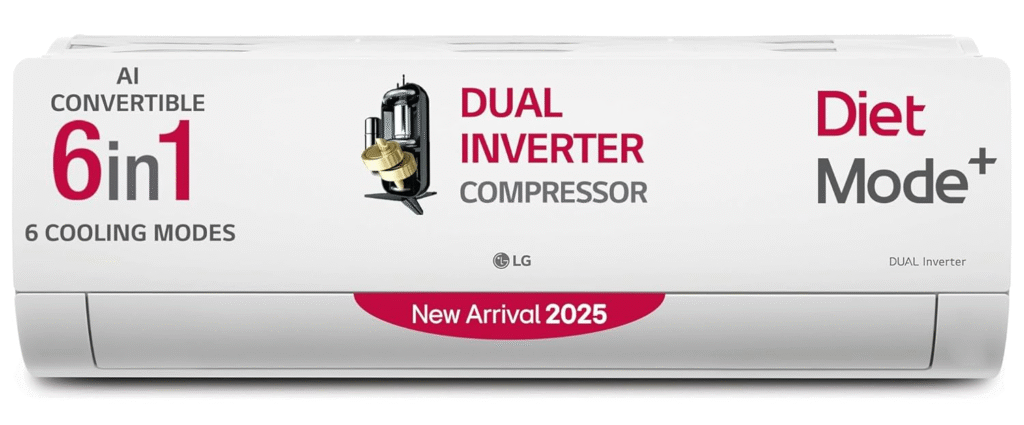
✅ Pros:
- Energy-efficient (5-star rated, ISEER 5.2)
- Dual Cool Inverter (faster cooling)
- Low noise (44 dB)
- Smart features (Wi-Fi control via ThinQ app)
❌ Cons:
- Expensive compared to others
- Installation may require professional help
2. Daikin 1.5 Ton 5-Star Inverter AC (Model: MTKM50TV)
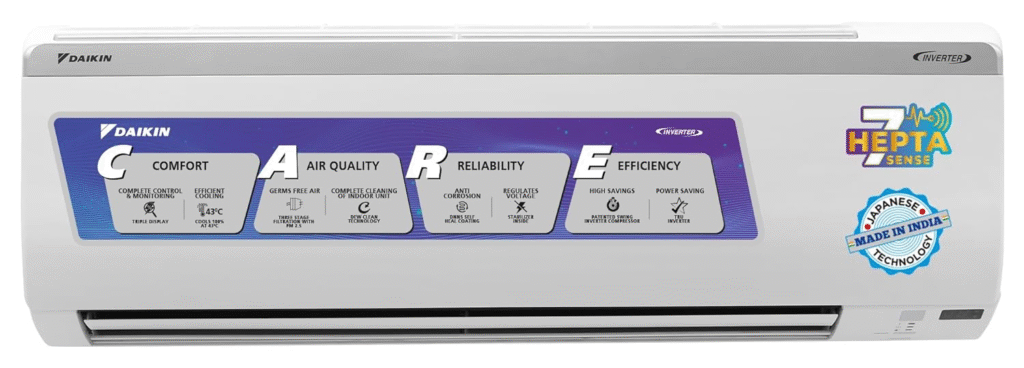
✅ Pros:
- High durability (Japanese technology)
- Energy-efficient (5-star, ISEER 5.2)
- Coanda airflow (wider cooling)
- Low maintenance
❌ Cons:
- Slightly higher price
- Basic design (no fancy features)
3. Voltas 1.5 Ton 3-Star Inverter AC (Model: 185V Vectra Elite)
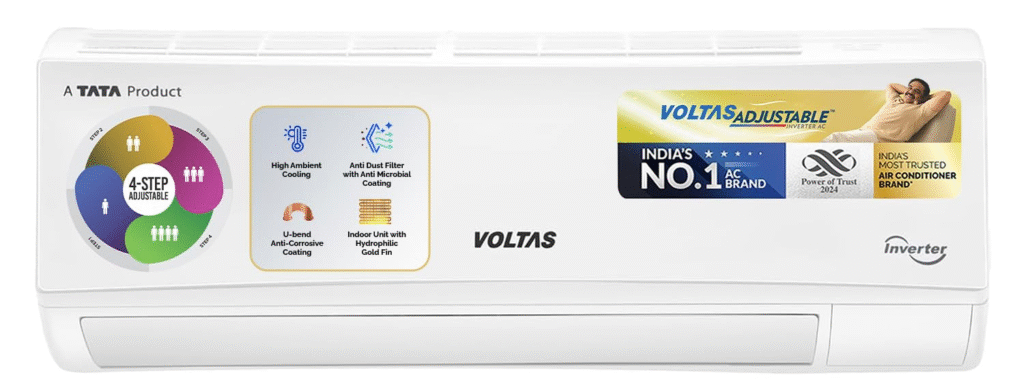
✅ Pros:
- Affordable inverter AC
- Good cooling performance
- 4-in-1 cooling modes
❌ Cons:
- Lower energy efficiency (3-star)
- No smart features
4. Blue Star 1.5 Ton 5-Star Inverter AC (Model: IC518RNU)

✅ Pros:
- Excellent cooling for Indian summers
- 5-star energy rating
- Turbo cooling mode
❌ Cons:
- No Wi-Fi connectivity
- Bulky design
5. Samsung 1.5 Ton 5-Star Inverter AC (Model: AR18CYLZABE)
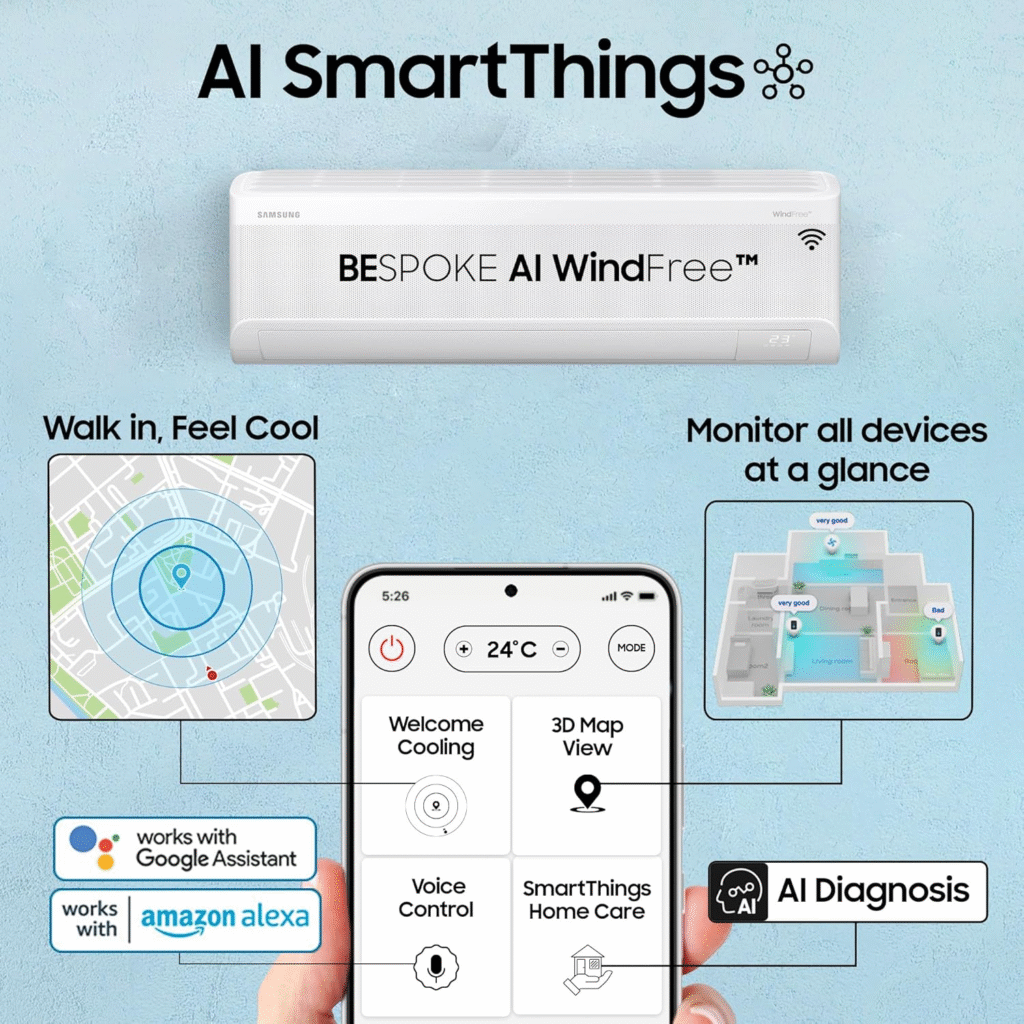
✅ Pros:
- Digital Inverter Boost Tech
- 8-in-1 cooling modes
- Good after-sales service
❌ Cons:
- Expensive
- Installation issues reported
Brand Comparison Table
| Brand | Model | Type | Star Rating | Price (₹) | Best For | Buy Link |
|---|---|---|---|---|---|---|
| LG | LS-Q19YNZE | Inverter | 5-star | ₹45,000 | Smart features | Amazon |
| Daikin | MTKM50TV | Inverter | 5-star | ₹48,000 | Durability | Amazon |
| Voltas | 185V Vectra Elite | Inverter | 3-star | ₹35,000 | Budget buyers | Amazon |
| Blue Star | IC518RNU | Inverter | 5-star | ₹46,000 | Powerful cooling | Amazon |
| Samsung | AR18CYLZABE | Inverter | 5-star | ₹47,000 | Advanced tech | Amazon |
Final Verdict: Which AC Should You Buy?
- Best Overall: LG 1.5 Ton 5-Star (Smart features + energy-efficient)
- Best Budget: Voltas 1.5 Ton 3-Star (Affordable inverter AC)
- Best for Durability: Daikin 1.5 Ton 5-Star (Reliable Japanese tech)
- Best Cooling Performance: Blue Star 1.5 Ton 5-Star (Turbo cooling mode)
If you prioritize long-term savings, go for a 5-star Inverter AC. If you need a cheaper option, a Non-Inverter AC may suffice for occasional use.
FAQ
Q1. Which AC consumes less electricity?
→ Inverter ACs save 30-50% energy compared to Non-Inverter ACs.
Q2. Is a 3-star AC good enough?
→ Yes, if used <6 hours/day. For >8 hours/day, choose a 5-star AC.
Q3. Which brand has the best after-sales service?
→ LG, Daikin, and Blue Star have strong service networks.
Final Thoughts
Choosing the right AC depends on budget, usage, and features. If you want maximum savings, invest in a 5-star Inverter AC. For occasional use, a Non-Inverter AC is cost-effective.
Have questions? Drop them in the comments!
🔗 Explore more deals: Amazon AC Offers
4. Brand & After-Sales Service
- Opt for reputed brands with good service networks (e.g., Daikin, LG, Voltas, Blue Star).
- Check warranty terms (inverter ACs may have longer warranties).
Conclusion: Which AC is Better?
If energy savings, comfort, and long-term benefits are your priorities, an inverter AC is the best choice despite its higher initial cost. However, if you need a budget-friendly option for occasional use, a non-inverter AC will work just fine.
Before buying, assess your cooling needs, usage frequency, and budget to make an informed decision. Both types have their pros and cons, so choose wisely based on what suits your lifestyle best!
Would you like recommendations on specific models? Let us know in the comments!
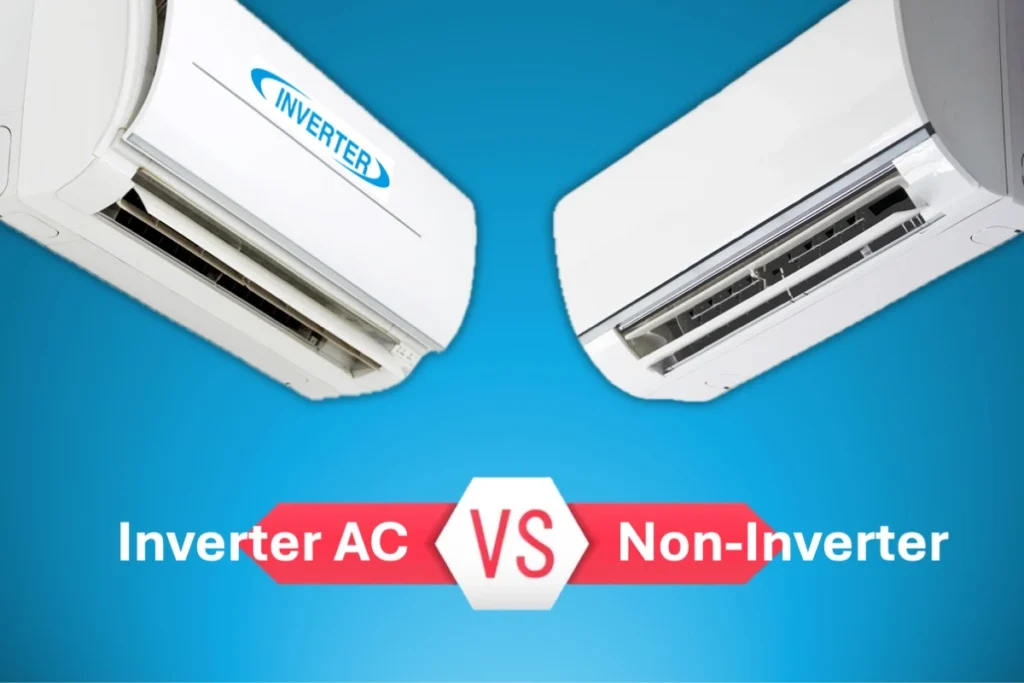


Pingback: Ton in Air Conditioning: What Does It Mean? (Not Weight!) - Tech Review